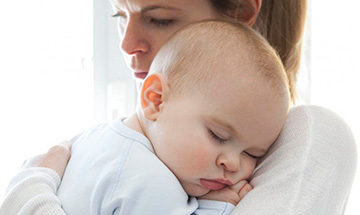Have you ever done everything right, by the book, for your baby, and when it’s time to sleep you find her playing or crying with lots of energy still pumping in her? I bet you did everything to make her sleep even though she looked tired, but it all turned out to be futile. Well, welcome to the fighting sleep class.

What does fighting sleep mean? You might wonder. It’s just as you must have guessed, and more. It’s simply when your baby acts hyper, cranky, kicking, and might even cry when you try to put her to bed. Do babies fight sleep? Of course, they do. You remember those times you could have sworn she was tired but she just threw all your attempts to put her to sleep out the window? There you have it! That’s your baby fighting sleep. That being said, we sure want to satisfy your curiosity as to how to get to the root of this act and probably put an end to it. Here is all you need to know about toddlers fighting sleep.
Why Do Babies Fight their Sleep?
Why do babies fight sleep? This could, no doubt, be the most asked question especially when you’ve had more than your fair share of sleepless nights watching your cutie throw tantrum. Don’t worry, we’ve been there and if this will make you feel better: virtually all parents have asked that same question before. There are diverse reasons for newborns fighting sleep but just three causes summed it all up.

- They are Overtired
We know you probably may have a good laugh reading the first reason for your toddler fighting sleep. However, that’s the truth! Unlike adults who sleep better when tired, your baby gets cranky and frenzied and has a surge of adrenaline making your baby keep fighting sleep. In order not to get confused, overtiredness occurs as a result of your baby missing a sleep window or you didn’t notice the sleep cues that were given. By the time you notice this, it’s already too late as your baby is already exhausted.
- They are Under tired
Yes! You guessed right, it swings both ways. The reason your baby fights sleep every night might be because she’s under tired. This is quite common in toddlers fighting sleep as they don’t use much of their energy during the day. Try and think about what your infant did during the day; did you take her out for fresh air? Did you play with her for a while? How about getting her to practice new skills like sitting up? No, right? Then, she’s going to give a protest anytime you want to put you’re her to bed. Since your baby is yet to be mobile, she’s using relatively close to zero energy so, with that much-unused energy, she can’t sleep. Under tiredness occurs mostly during the 9-month sleep regression and that makes it a common reason for infants fighting sleep.
- They Have Separation Anxiety/FOMO
This happens when your baby is becoming more conscious of things going on around him, usually around 8 to 10 months. Your kids at this stage want nothing but to be closer to you every time and that in itself matters more than sleep to him, because he no longer feels or sees you when asleep. Talk about love and comfort, right?
This’s the time your baby is at a developmental milestone such as crawling. You will notice your baby keeps fighting sleep as he doesn’t want to miss out on the milestone he’s working on. FOMO is also known to occur when your baby is in a new environment, as unfamiliar faces and environment can cause baby fighting sleep.
How to Get a Baby to Stop Fighting Sleep
“My baby fights sleep!” you might want to scream, we get you. So, what to do when babies fight sleep? You might ask. Well, since the reasons for your newborn fighting sleep can vary. Let’s take a look at what works for the various causes of sleep fighting.

We’ll take a wild guess — your baby doesn’t wake at the same time every day. We know we are right. So, why try to make them have their nap time at the same time? Rather than being concerned about when your baby should take a nap, take your focus on the awake windows instead. This’s the time in which your baby stays awake before falling back or being put to sleep. An hour to two hours wake window range is often recommended for babies depending on age. So instead of having an exact naptime, keep in touch with the wake window and when it’s time, you should put your baby to bed. Although your baby might give sleeping cues within this time range, you shouldn’t expect it every time as they might even get hyper. Always keep records of the wake window and adjust as time goes on to prevent your baby from fighting sleep. If you notice your baby is always under tired, you might have to cut down on the wake naptime and vice versa.
- Tweak Your Bedtime
If your baby keeps fighting sleep due to overtiredness, then it’s advised to begin your routine earlier than usual. Take into consideration your routine before picking time. Half an hour is the standard time but if your routine goes beyond this time, then you can adjust to fit. On the other hand, a fifteen minutes tweak for bedtime can go a long way in improving your toddler’s sleep if under tired.
- Have a Consistent Routine
Another way to prevent newborns from fighting sleep is by having a consistent routine you practice when putting your baby to bed or nap time. As strange as it may sound, your baby notices these things during your newborn sleep schedule. The commonest thing to do is read your baby a story or sing a lullaby after putting him to bed. Although it might take up to three weeks for your baby to get used to this sleep signal, the result can be pleasing as it helps infants fighting sleep.

- Be Available for your Baby
This is essential especially for a baby having separation anxiety or fear of missing out. Be there to comfort your baby, but don’t falter on your sleeping routine. Provide all that your baby needs as that would go a long way in comforting him too.
Babies Sleeping Tips
- Limit the Length and Number of Nap Per Day
Waking your baby from nap seems like a hard thing to do, but a prolonged naptime can make your baby fight sleep every night. If your baby’s naptime is getting way over two hours, you can wake him up, feed him, and keep him engaged for a while before preparing him for another nap. By doing this, you are not only feeding your baby more properly, but you’re also preparing him for a night of better night sleep.
- Get a Swaddle
Newborns within the age of four to five months have startle reflexes that give them a falling sensation. This action can jerk them out of sleep and will inevitably disturb your sleep. For your newborn fighting sleep to have a night of better, longer sleep, you can purchase any of the best swaddle blankets to ensure this.
- Introduce White Noise
This doesn’t only help your baby slip to slumber quicker, but it also ensures that they sleep deeper. The best baby sound machine can help your baby fight FOMO, especially in an unfamiliar environment. So, you don’t have to go through any trouble with your baby’s sleep routine when visiting your family or friends.
When Do Babies Stop Fighting Sleep

While it can vary from kid to kid, the common time babies stop fighting sleep is around the tenth month. Although this often resurfaces mildly when they reach 18 months of age, some kids do experience it at a long stretch, that is; from 3 months old to 18 months depending on how the parents handled it.
Conclusion
Parenting; no doubt is not an easy task even though we can all agree it has its fun side. However, your baby fighting sleep shouldn’t be part of the things that make it a strenuous task. This’s why we at parenthoodroutine.com have given you all you need to not only pass through this process easier, but also to enjoy it as you move to the next stage of parenting.









